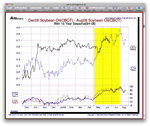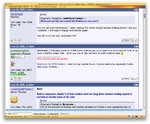Again, you are failing to take into account that you are working with a leveraged investment. The margin you have in your account is only a fraction of the value of the investment you are making.
Using GT's figures, a $300 margin allows you to control $1,000,000 worth of investment. Your leverage is therefore a massive 3300 (rounded down for convenience!) If you invest $1,000,000 and make 0.03% your profit is $300... But since you have only "risked" $300 your rate of return on capital used is 100%.
I think the best way for you to look at it, given the more traditional approach you seem to be viewing it from, is that you are not investing $300... you are borrowing $1,000,000 with a guarantee to repay, and then you are investing the million.
If your investment is a good one, then when you close out you pay off the $1,000,000 loan and what's left is yours to keep. If your investment goes sour, then when you close out you have to find the cash to pay back the full $1,000,000. The $300 margin is just a deposit that you give the loan company in case you make a loss.
Yes, you can lose the entire $300... very often... and sometimes you can lose more... but the upside is that you can win a lot of money as well.
Only put into a leveraged product the amount of money you are prepared to lose (completely). Because the amount of money you could lose (theoretically) is 3,300 times that.
No you are still missing my point.
I understand that trading futures and particularly spreads (given their lower margin requirements) can involve a huge amount of leverage. I understand leveraging and what this means for position size,and risk and money management. This does not mean that you should only use cash that you are willing to completely bomb. How can you possibly ensure that you are trading with the most effective level of exposure to ensure the best, most consistent yet sustainable growth in your wealth?
Quote from "Spreadtrading" by Howard Abell (not about spreadbetting by the way),
"One of the fatal flaws many traders make is to relax their money management criteria because they are trading a spread. Spreads can and do have large moves that can surprise the unwary.
It cannot be said too often or too loudly that the approach to successful spread trading has to be the same as the approach to successful outright trading."
Abell makes it very clearly in his book that clearly defined money and risk management are both fundamental to successful spread trading.
Obviously with an approach of only spread trading money you can afford to lose, you are not going to go completely broke. However, with a bad run you could wipe out your entire trading capital and have to refund it with cash from elsewhere. Also, it doesn't appear to be an approach that truely owns and understands and manages the risk reward relationship in your trading. Neither does it seem to be an approach to ensure that you are in the game as long as possible and are utilising your capital and leverage to the most effective yet sustainable level possible.


